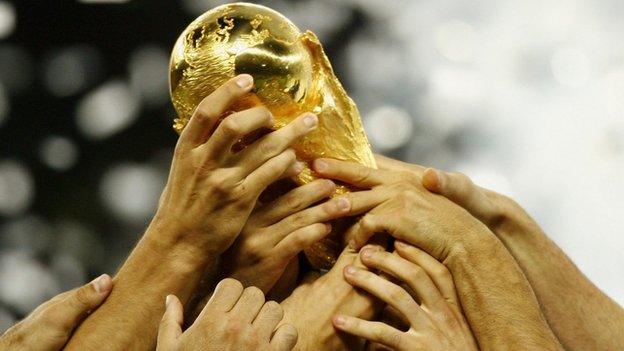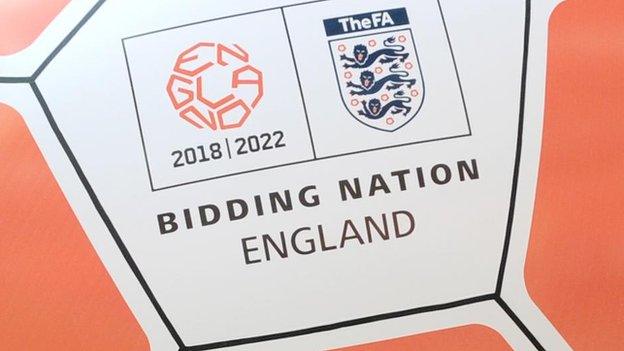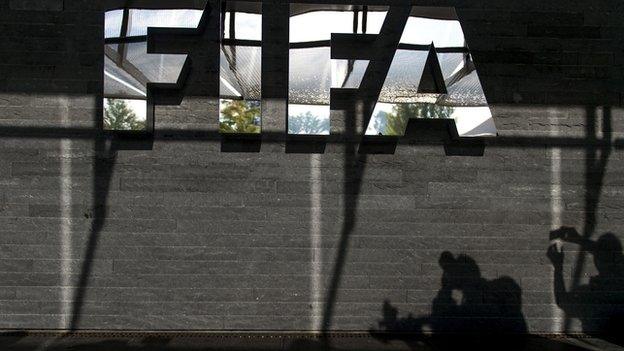Fifa whistleblower Phaedra Al-Majid fears for her safety
- Published
Fifa whistleblower Phaedra Al-Majid on 'culture of secrecy'
Fifa whistleblower Phaedra Al-Majid says she will "look over my shoulder for the rest of my life" after making allegations of corruption against Qatar's successful 2022 World Cup bid.
In a two-year inquiry which cleared Qatar,, external Al-Majid repeated allegations she made and later retracted in 2011.
She told the BBC her accusations introduced her to "a whole new culture of paranoia, fear and threats".
In response, Qatar said they "stand by the integrity of their bid".
They said a series of allegations about their conduct had been "over a period of years, investigated, tested, considered and dismissed".
Al-Majid worked as an international media officer for the Qatar 2022 bid team before losing her job in 2010.
Her allegations that Qatari bid officials offered to pay for the votes of three Fifa members first came to light in 2011. Later the same year, she signed an affidavit saying they were false.
She now says she was coerced into changing her statement.
"I had no more legal representation," she said. "When the Qataris approached me, I was alone. I'm also the single mother of two children, one of whom is severely autistic and severely disabled."
Al-Majid said officers from the FBI visited her in September 2011 after they became aware of threats against her.
She said: "They questioned me about the Qatari bidding process and they questioned me about all the threats I had received from the Qataris.
Qatar response to Al-Majid's claims |
|---|
"We stand by the quality and integrity of our bid and will not comment further at this time on allegations that have been, over a period of years, investigated, tested, considered and dismissed." |
"It was decided at that point that I would help them with their investigation and it was planned that I would talk to a senior official at the Qatar bid.
"So when I talked to the official - and the FBI are recording this - he did admit that there was a deal for the affidavit, that I would basically say that they had done no wrongdoing."
Al-Majid, who says she is "tired of Fifa's culture of secrecy", provided all her information to Michael Garcia, the US investigator appointed by Fifa to look into allegations of wrongdoing during the bidding process for the 2018 and 2022 World Cups.
But judge Hans-Joachim Eckert, who released a 42-page summary of Garcia's findings on 13 November, said her evidence contained "inconsistencies" which prejudiced its credibility.
In contrast, Qatar say they supplied "full and valuable" assistance to the Garcia enquiry, which ran for two years.
"We stand by the quality and integrity of our bid and will not comment further at this time on allegations that have been, over a period of years, investigated, tested, considered and dismissed," added a statement from the Qatar 2022 Supreme Committee.
Garcia subsequently criticised Eckert's summary and the pair are due to meet on Thursday.
Meanwhile, Fifa president Sepp Blatter has rejected FA chairman Greg Dyke's call to publish Garcia's findings in full.
Blatter says publishing the report would break Fifa's rules and Swiss law, claiming every person in the report would have to give consent to publication - something that would be practically impossible.
Blatter asks if Dyke's letter may be interpreted as "providing consent" on behalf of any member of England 2018's bid team and "as a corresponding waiver of any legal action in the event of such publication."
Fifa has already announced it has filed a criminal complaint with the Swiss attorney general in respect of unnamed individuals who report names may have breached Swiss law during the World Cup bidding.
- Published13 November 2014
- Published17 November 2014

- Published13 November 2014

- Published18 November 2014
